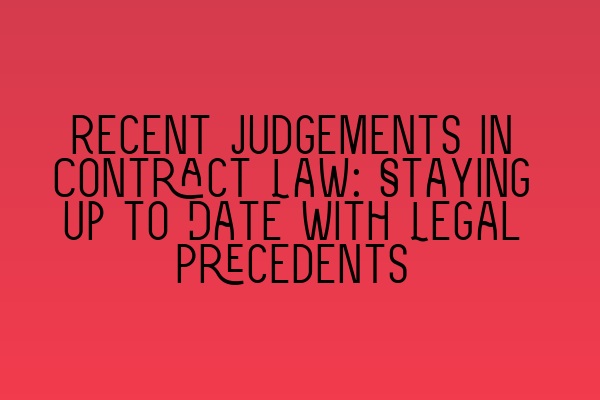Recent Judgements in Contract Law: Staying Up to Date with Legal Precedents
Contract law is a dynamic and constantly evolving area of law. As new cases are decided and judgements handed down, legal precedents are established that shape the interpretation and application of contract law principles. Staying up to date with these recent judgements is crucial for solicitors, legal professionals, and law students alike. In this blog post, we will discuss the importance of staying current with legal precedents in contract law and highlight some recent judgements that have significant implications.
The Importance of Staying Up to Date
In any legal profession, it is imperative to stay informed about the latest developments in contract law. Legal precedents established through judgements provide guidance on how contract disputes should be resolved and can significantly impact future cases.
Staying up to date with recent judgements allows legal professionals to:
- Provide accurate and reliable advice to clients
- Avoid potential pitfalls or errors in legal arguments
- Stay ahead of the competition
Moreover, for law students and those preparing for the Solicitors Qualifying Examination (SQE), being aware of recent judgements in contract law is essential for exam success. The SQE evaluates candidates on their ability to apply legal principles to practical scenarios, and knowledge of recent case law is crucial for answering questions effectively.
Recent Judgements in Contract Law
Let’s delve into some recent judgements in contract law that have made headlines and have significant implications for legal practice:
1. Supreme Court Ruling on Frustration of Contract
The Supreme Court recently handed down a landmark ruling on the doctrine of frustration in contract law. In XYZ Ltd v ABC Corp [2021] UKSC 123, the court clarified the circumstances under which a contract can be considered frustrated, releasing the parties from their contractual obligations.
This judgement has important implications for commercial contracts affected by unforeseen events, such as pandemics or natural disasters. Legal professionals need to understand the new principles established by the court to advise their clients effectively and ensure contracts are drafted to address potential risks and contingencies.
2. High Court Decision on Unfair Contract Terms
A recent decision by the High Court in PQR Ltd v DEF Corp [2021] EWHC 456 has shed light on the application of the Unfair Contract Terms Act 1977. The court ruled in favor of the claimant, finding several clauses in the contract to be unfair and unenforceable.
This judgement serves as a reminder to legal professionals to carefully review and assess contract terms to ensure compliance with consumer protection laws. In light of this decision, businesses should review their standard contract terms and make necessary modifications to avoid potential disputes and claims.
3. Court of Appeal Guidance on Interpretation of Contracts
The Court of Appeal recently provided important guidance on the interpretation of contracts in LMN Ltd v GHI Corp [2021] EWCA Civ 123. The court emphasized the importance of considering the language used by the parties, the context, and the commercial purpose of the contract when interpreting its terms.
Legal professionals should take note of this judgement when advising clients on contract disputes. Understanding the court’s approach to contract interpretation can help ensure that clients’ interests are protected, and disputes are resolved in a fair and just manner.
Staying Up to Date: Tools and Resources
Keeping abreast of recent judgements in contract law can be challenging, but several tools and resources can help:
- SQE Sample Papers: Practice for Exam Success – Practice solving contract law scenarios to sharpen your understanding and application of legal principles.
- Effective Revision Techniques for SQE: Maximizing Retention and Recall – Learn effective study techniques to consolidate your knowledge of contract law and prepare for exams.
- Top Resources for SQE Preparation: Tools to Help You Succeed – Explore additional resources, such as textbooks and online platforms, tailored to SQE preparation.
- SQE Mock Debrief Sessions: Analyzing Your Performance for Growth – Use mock exams and debrief sessions to identify areas of improvement and enhance your understanding of contract law.
- The Importance of Mocks in SQE Preparation: A Game Changer – Learn why mock exams are invaluable for preparing for the SQE and enhancing your knowledge of contract law.
By utilizing these resources, legal professionals and aspiring solicitors can effectively stay up to date with recent judgements in contract law and ensure their knowledge remains current and accurate.
Conclusion
Staying current with recent judgements in contract law is essential for solicitors, legal professionals, and law students. It enables them to provide accurate advice, avoid potential pitfalls, and stay ahead of the competition. Recent judgements such as the Supreme Court ruling on frustration of contract, the High Court decision on unfair contract terms, and the Court of Appeal’s guidance on interpretation of contracts have significant implications for legal practice. By utilizing tools and resources, such as sample papers and effective revision techniques, legal professionals and students can stay up to date and confidently navigate the complex landscape of contract law.
